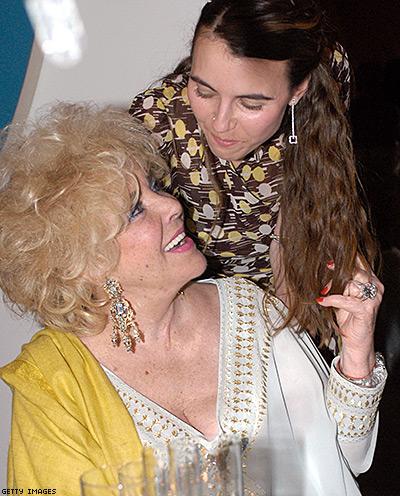
Elizabeth Taylor with her granddaughter Naomi Wilding at a private dinner held in Taylor’s honor on March 18, 2003 at the Frederick R. Weisman Art Foundation in Los Angeles, California. Taylor received the first-ever Diamond Icon Award for her courage and leadership in the fight against AIDS. © Dan Steinberg/Getty Images
The Hollywood legend founded AIDS organizations, inspired generations of people with HIV, and left behind a family tree of people who continue to work on our causes.
The Hollywood starlet turned film legend left another legacy of equal importance: She founded or benefited a number of AIDS organizations, inspired generations of people with HIV, moved policy and politicians, and left behind a family tree of people who continue to work on HIV and AIDS causes. Here’s what she begot.
Organizations Taylor Founded
National AIDS Research Foundation: In Los Angeles in 1985, Taylor and Dr. Michael Gottlieb cofounded the National AIDS Research Foundation to research, find a cure and help people living with AIDS. At the same, Dr. Mathilde Krim established the AIDS Medical Research Foundation. These two merged to become…amfAR, cofounded by Krim and Gottlieb with Taylor as its international founding chairperson. With the success of amfAR and people with HIV beginning to live longer, Taylor established the Elizabeth Taylor AIDS Foundation in 1991 to focus specifically on funding organizations that cared for individuals with HIV or AIDS. Taylor sold her wedding photos to People for $1 million and used the money in its entirety to open the doors of ETAF. To date, more than 650 organizations in 33 countries have been helped through ETAF’s funding efforts.
Taylor’s Leadership Impacted These Groups
Taylor organized the first Hollywood fundraiser benefiting HIV and AIDS in September of 1985, for AIDS Project Los Angeles. Taylor called all her friends within the entertainment industry and was able to wrangle some the biggest names in Hollywood and elsewhere, including Madonna, Warren Beatty, and Betty Ford. In 1986, Taylor was honored at the group’s second Commitment to Life.
The ETAF provided its first major grant to Project Angel Food, a lifeline for those diagnosed with serious ailments. Taylor was a trustee until her death. In 2014, on the 25th anniversary of Project Angel Food, the organization presented Taylor’s former daughter-in-law, Aileen Getty, with the newly created Elizabeth Taylor Legacy Award.
The first AIDS organization in the state of Arizona, Arizona AIDS Trust got the Hollywood treatment in 1986 when Elizabeth Taylor brought Bob Hope to take part in its Gift of Life event. Arizona AIDS Trust board member Kirk Baxter recalls, “It brought Hollywood glamour to the Valley of the Sun and, more importantly, a renewed chance for life for so many.”
Visual AIDS created the now-ubiquitous red ribbon for the 1991 Tony Awards as a symbol of support and compassion for those living with HIV. Executive director Nelson Santos says, “When Elizabeth Taylor pinned one on, it became an internationally renowned symbol of AIDS awareness. Ms. Taylor was rarely seen without a red ribbon.”
Taylor attended the opening of the Elizabeth Taylor Medical Clinic at Whitman-Walker, established in her name, in Washington, D.C., in 1993. (The clinic currently provides free HIV testing and medical services.) In 2005, when the Elizabeth Taylor Endowment Fund was established for Clinical AIDS Research and Education at the University of California, Los Angeles (UCLA CARE Center), Taylor was there for the ribbon-cutting ceremony.
Playing a major role in the unfurling of the Names Project Quilt’s 1996 display in D.C., Taylor led a candlelight vigil and gave a rousing call to action on the steps of the Lincoln Memorial. For many Americans it was the first they had heard of the Quilt.
Taylor became the founding chair of Macy’s Passport in 1987 when the five-year-old event first expanded to Los Angeles. Passport began in 1982 as an awareness-raising fashion show in the Macy’s employee cafeteria. It has since grown into one of the largest and longest-running HIV fundraising events of its kind and, along with Macy’s Foundation, has donated more than $31 million to HIV and AIDS services, prevention, education, and research.
In the aftermath of Hurricane Katrina, ETAF created a mobile medical clinic to help people with HIV or AIDS receive proper care and medications. Impacted by the reverberations of the hurricane, Taylor recognized that in Third World countries, including many in Africa, poor access to health care is a reality daily, not just after a natural disaster. In 2008, Taylor reached out to the Global AIDS Interfaith Alliance to discuss a method to properly service locations in Africa with the greatest distance to health care and the highest prevalence of HIV and AIDS. As a result of the partnership, the Elizabeth Taylor Mobile Medical Clinics were created and have now become GAIA’s largest medical assistance program. Today, there are seven mobile clinics in Malawi, five of which are in the Mulanje region, where on weekdays no one has to walk more than an hour to get to proper health care. HIV has since decreased by 50 percent in that region.
Source: HIV Plus Magazine
A very special thank you to The Elizabeth Taylor. Thank you for all your help in the fight against HIV and AIDS. Thank you for your love and generousity in helping to heal. You will remain forever in our remembrance!
Kiumars Seraj Elahy
(- Qualified as a multiplier of the “Mumm-Project”, initiated by the “German AIDS Service Organization” (DAH) in cooperation with the “Berlin AIDS Service Organization” (BAH) for HIV / STI-Prevention, living with HIV and for the education of migrants about the health care system in Germany.
– Participant as an interviewer on the German AIDS Service Organization’s project “Positive Voices” in the fight against stigma and discrimination of people living with HIV / AIDS in Germany.)
